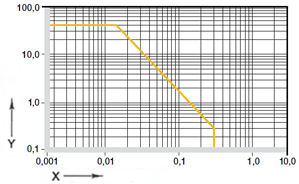Similar to the classic, iglidur® J, iglidur® J260 is an endurance runner with outstanding wear behavior, but provides increased margins at its long-term application temperature of +120°C.
iglidur® J 260 - material data
| General features | Unit | iglidur® J260 | test method |
| Density | g/cm³ | 1,35 | |
| Colour | yellow | ||
| Max. humidity absorption at 23°C/50% R. H. | % weight | 0,2 | DIN 53495 |
| Max. water absorption | % weight | 0,4 | |
| Coefficient of surface friction, dynamic, against steel | µ | 0,06 - 0,20 | |
| PV values max. (dry) | MPa x m/s | 0,35 | |
Mechanical properties |
|||
| Bending E-module | MPa | 2.200 | DIN 53457 |
| Tensile strength at +20 °C | MPa | 60 | DIN 53452 |
| compressive strength | MPa | 50 | |
| Maximum recommended surface pressure (20° C) | MPa | 40 | |
| Shore D hardness | 77 | DIN 53505 | |
Physical and thermal properties |
|||
| Max. long term application temperature | °C | +120 | |
| Max. short term application temperature | °C | +140 | |
| Lower application temperature | °C | -100 | |
| Heat conductivity | [W/m x K] | 0,24 | ASTM C 177 |
| Coefficient of thermal expansion (at 23° C) | [K-1 x 10-5] | 13 | DIN 53752 |
Electrical properties |
|||
| Specific forward resistance | Ωcm | > 1012 | DIN IEC 93 |
| Surface resistance | Ω | > 1010 | DIN 53482 |
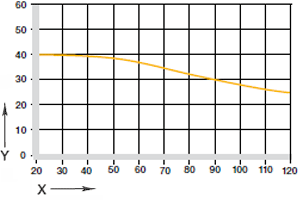
Figure 02: Maximum recommended surface pressure dependent on the temperature (40 MPa to +20 °C)
X = Temperature [°C]
Y = Load [MPa]
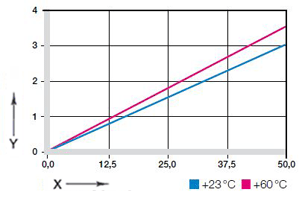
Figure 03: Deformation under load and temperatures
X = Load [MPa]
Y = Deformation [m/s]
Maximum recommended surface pressure represents a mechanical material parameter. Tribological conclusions cannot be drawn from it. With increasing temperatures, the compressive strength of iglidur® J260 plain bearings decreases. Fig. 02 clarifies this connection.
Figure 03 shows the elastic deformation of iglidur® J260 with radial loads. Under the maximum recommended surface pressure of 40 MPa, the deformation amounts to less than 2,5%. A potential plastic deformation depends, among other things, on the length of exposure.
| m/s | Rotary | oscillating | Linear |
| Constant | 1 | 0,7 | 3 |
| Short-term | 2 | 1,4 | 4 |
iglidur® J260 is developed for low to medium surface speeds. The maximum values stated in the Table 02 can be attained only with minor pressure loads. At the specified speeds, an increase in temperature up to the long-term permitted value can occur due to friction. In practice these limit values are not always reached.
| iglidur® J260 | Operating temperature |
| Lower | - 100 °C |
| Upper, long-term | + 120 °C |
| Upper, short-term | + 140 °C |
| Secure axially in addition | + 80 °C |
The temperatures prevailing in the bearing system also have an influence on the bearing wear. The wear increases with rising temperatures, and the influence is especially marked from 80°C temperature onwards. An additional securing is recommended at temperatures higher than +80°C.
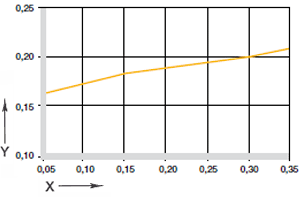
Figure 04: Coefficients of friction dependent on the surface speed, p = 0,75 MPa
X = Surface speed [m/s]
Y = Coefficient of friction μ
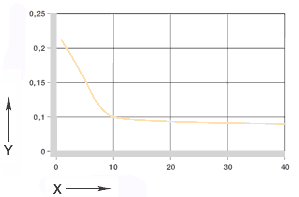
Figure 05: Coefficients of friction dependent on the load, v = 0,01 m/s
X = Load [MPa]
Y = Coefficient of friction μ
Just like the wear resistance, the coefficient of friction µ, friction coefficient in short, also alters with the load. Interestingly the coefficient of friction decreases with increasing load, whereas an increasing surface speed causes a slight rise in the coefficient of friction (Fig. 04 and 05).
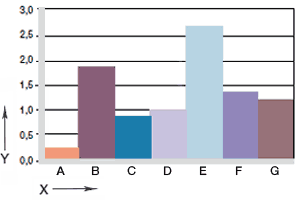
Figure 06: Wear, rotating application with different shaft materials, p = 1 MPa, v = 0,3 m/s
X = shaft materials
Y = wear [μm/km]
A = Aluminum, hard-anodized
B = machining steel
C = Cf53
D = Cf53, hard chrome-plated
E = St37
F = V2A
G = X90
Friction and wear also depend to a high degree on the shaft material. Very smooth shafts increase the coefficient of both friction and wear. A smoothed surface with an average surface finish Ra = 0.8 µm is best suited for iglidur® J260. Fig. 06 shows the results of tests of different shaft materials with plain bearings made of iglidur® J260. In this connection it is important to note that with increasing loads, the recommended hardness of the shaft increases. The "soft" shafts tend rather to wear themselves and thus increase the wear of the entire system, if the loads exceed 2 MPa. The comparison of rotation and swivelling in Figure 07 makes it very clear that iglidur J260 bearings display their strengths especially in the rotating operation.
| iglidur® J260 | Dry | Grease | Oil | Water |
| Coefficients of friction μ | 0,06–0,20 | 0,09 | 0,04 | 0,04 |
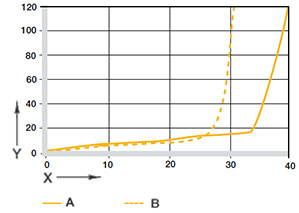
Figure 07: Wear in pivoting and rotating applications with Cf53 dependent on the load
X = Load [MPa]
Y = Wear [μm/km]
A=Rotating
B=Pivoting
| Medium | Resistance at 20°C |
| Alcohols | + to 0 |
| Hydrocarbons | + |
| Fats, oils, without additives | 0 to – |
| Fuels | – |
| Diluted acids | – |
| Strong acids | – |
| Diluted bases | + to 0 |
| Strong bases | + to 0 |
| Specific forward resistance | > 1012 Ωcm |
| Surface resistance | > 1010 Ω |
iglidur® J260 plain bearings are resistant to diluted alkalis, hydrocarbons and alcohols. The extremely low humidity absorption also allows them to be used in wet or humid environment.
Resistant up to a radiation intensity of 3x 102 Gy
Partly resistant against UV rays
In application in vacuum, the potentially existent moisture content is degassed. For this reason only the dry iglidur® J260 bearings are suitable for vacuum.
iglidur® J260 bearings are electrically insulating.
The humidity absorption of iglidur® J260 bearings amounts to about 0.2 % in standard climatic conditions. The saturation limit in water is 0.4 %. These values are so low that a consideration of the expansion due to moisture absorption can be neglected.
| Maximum moisture absorption | |
| by +23 °C/50 % r. F. | 0,2 Wt.-% |
| Max. water absorption | 0,4 Wt.-% |
Table 06: Moisture absorption
| Diameter d1 [mm] |
Shaft h9 [mm] |
iglidur® J260 E10 [mm] |
Housing H7 [mm] |
| Up to 3 | 0 - 0,025 | +0,014 +0,054 | 0 +0,010 |
| > 3 to 6 | 0 - 0,030 | +0,020 +0,068 | 0 +0,012 |
| > 6 to 10 | 0 - 0,036 | +0,025 +0,083 | 0 +0,015 |
| > 10 to 18 | 0 - 0,043 | +0,032 +0,102 | 0 +0,018 |
| > 18 to 30 | 0 - 0,052 | +0,040 +0,124 | 0 +0,021 |
| > 30 to 50 | 0 - 0,062 | +0,050 +0,150 | 0 +0,025 |
| > 50 to 80 | 0 - 0,074 | +0,060 +0,180 | 0 +0,030 |
| > 80 to 120 | 0 - 0,087 | +0,072 +0,212 | 0 +0,035 |
| > 120 to 180 | 0 - 0,100 | +0,085 +0,245 | 0 +0,040 |
Table 07: Important tolerances iaw. ISO 3547-1 after press-fitting.
iglidur® J260 bearings are standard bearings for shafts with h-tolerance (recommended minimum h9). The bearings are designed for press-fit in a housing with h7 tolerance. After the installation in a housing with nominal diameter, the inner diameter of the bearing automatically adjusts to the E10 tolerance. In certain dimensions the tolerance in dependence on the wall thickness deviates from this (See delivery program )
More than 100,000 products available! Delivery and consultation Mon-Fri from 7am-8pm and Sat from 8am-12pm!
